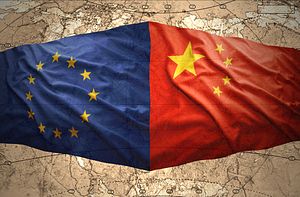On Monday, China heavily criticized the European Parliament for a resolution passed last week that squarely took aim at Beijing’s bid for market economy status at the World Trade Organization (WTO).
In the non-binding resolution last Thursday, EU legislators declared that China still fails to meet the criteria for a market economy as defined by EU law and that there is no justification to ease current anti-dumping and anti-subsidy measures under which the EU can impose retaliatory tariffs on Chinese imports found to be below market price.
The resolution passed with an overwhelming majority: 546 Members of the European Parliament (MEPs) gave their support, with 28 against and 77 abstaining from the vote.
Attaining market economy status in the WTO would bring tremendous benefits to China; it would no longer be subject to existing trade restriction mechanisms on many of its exports to the EU. Currently, 56 of the EU’s 73 anti-dumping tariffs apply to imports from China.
China maintains that it should be automatically granted market economy status at the end of this year as a condition of its initial entry into the WTO in November 2001.
Chinese Foreign Minister Wang Yi told The People’s Daily, “It is an obligation for all the WTO members not subject to any member’s criteria at home.”
But many European leaders disagree with that interpretation, as signaled through their recent vote. The European Commission, which negotiates on behalf of the European Union in the WTO, is expected to put forward a proposal in the coming months regarding the contentious status.
Thus, while last week’s resolution by lawmakers has no immediate legal impact, the message of the European Parliament—which must approve of any action taken by the Commission—is clear: they don’t want cheaper Chinese goods and materials competing with their industries at home. Through the vote, the MEPs voiced their disapproval of any potential proposal that would leave EU businesses’ vulnerable.
David Martin, a member of the European Parliament from the U.K.’s Labour party told Politico: “This vote sends a strong signal that the European Parliament will not accept any measures that weaken our ability to defend ourselves from unfair Chinese competition.”
In a press release, the European Parliament pointed to the EU’s steel industry, which has floundered in recent months, as a prime example of would-be losers of China achieving market economy status. With China producing half the world’s steel and its construction industry struggling domestically, Beijing’s exports have risen dramatically and led to decreased prices and margins globally.
China, meanwhile, vocally rebuts arguments that it is to blame for the supply glut. “As the world’s second largest economy and biggest trade partner for more than 130 countries, China has become a bedrock for protecting global free trade,” Foreign Minister Wang told The People’s Daily.
Many experts expect China to pursue legal action in the WTO court if not granted market economy status. It remains to be seen if a political deal—one which could include exemptions for certain goods and materials—can be reached between China and the 28 EU members states to prevent the dispute from eventually going to trial.
If China obtains market economy standing, other countries and trade unions would have to refer to Chinese market prices when appealing to enact anti-dumping measures. This represents a major difference from the current WTO procedures under which third-party nations’ prices can be used as baselines for importing nations to make their case that Chinese products are unfairly undervalued. If granted the status, challenging nations will no longer have the additional leverage in WTO court.
“Whether the EU grants market economy status to China or not, it needs to deliver on its WTO obligations rather than dodge them,” Wang said, according to Xinhua.
Peter Bittner is an editorial assistant at The Diplomat.
































